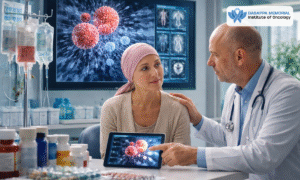Cancer warning signs are often subtle, which is why many people miss them until the disease has progressed. Unlike sudden illnesses, cancer usually develops slowly, giving early signals that something is not right. Recognizing these early cancer symptoms can make a huge difference in timely treatment and better outcomes.
In this blog, we will walk you through the 10 common cancer signs most people ignore, explain why they matter, and guide you on when you should see a doctor for cancer symptoms. By the end, you will know how to stay alert to potential risks, what to watch for in your daily life, and how early detection can save lives.
Why Paying Attention to Cancer Symptoms Matters

Cancer often begins quietly. A small lump, a persistent cough, or unusual fatigue may not feel serious at first. But ignoring these signals allows cancer cells to grow and spread.
Understanding these warning signs is not about creating fear; it’s about giving yourself and your loved ones the chance to act early. With modern medical advances and timely diagnosis, many cancers can be managed effectively.
10 Cancer Warning Signs You Should Not Ignore
1. Unexplained Weight Loss
Sudden weight loss without changes in diet or exercise may indicate an underlying health problem. In cancer, this happens because tumours use up the body’s energy or affect metabolism.
Example: A person losing 5–10 kg in a few months without trying should consider consulting a doctor.
2. Persistent Fatigue

We all feel tired sometimes, but cancer-related fatigue is constant and doesn’t improve with rest. It may be linked to blood cancers such as leukemia or lymphoma, or cancers that cause chronic inflammation.
Tip: If tiredness affects your daily routine despite enough sleep, seek medical advice.
3. Lumps or Swelling
A new lump under the skin, in the breast, neck, or armpits, should never be ignored. While not all lumps are cancerous, some could be tumors that need immediate evaluation.
Key point: Early breast cancer is often detected by women themselves while bathing or dressing.
4. Changes in Skin
Cancer symptoms skin-related include new moles, changes in mole color or size, non-healing wounds, or unusual patches. Skin cancers like melanoma often begin with such signs.
Tip: Follow the ABCDE rule for moles: Asymmetry, Border irregularity, Color changes, Diameter over 6 mm, Evolving shape.
5. Persistent Cough or Hoarseness
A cough lasting more than 3 weeks, especially in smokers, may be linked to lung cancer. Hoarseness could also signal cancers of the throat or larynx.
Example: If a cough is accompanied by blood in sputum or chest pain, consult a doctor immediately.
6. Changes in Bowel or Bladder Habits
Blood in stools, prolonged constipation, diarrhea, or difficulty urinating can point to colon, bladder, or prostate cancers.
Tip: Don’t dismiss blood in stools as piles; it could be an early cancer symptom.
7. Non-Healing Sores
Any sore in the mouth, on the lips, or genitals that does not heal within 2–3 weeks may be cancerous. Oral cancers are particularly common in people who use tobacco or alcohol.
8. Persistent Pain
While most pain comes from non-serious causes, ongoing pain in the bones, back, or abdomen could be a cancer warning sign. Pain that worsens at night or doesn’t respond to regular medication should be checked.
9. Abnormal Bleeding
Unusual bleeding, such as blood in urine, coughing up blood, abnormal vaginal bleeding (outside of periods or after menopause), or nosebleeds, may indicate cancers in related organs.
10. Difficulty Swallowing or Indigestion
Trouble swallowing food, feeling food stuck in the throat, or frequent indigestion may be linked to esophageal or stomach cancer.
Quick Look: Common Cancer Signs at a Glance
| Warning Sign | Possible Cancer Type | When to Act |
|---|---|---|
| Unexplained weight loss | Stomach, pancreas, lung, blood | If you lose more than 5 kg without a reason |
| Persistent fatigue | Leukemia, lymphoma, colon, stomach | If fatigue persists for more than 2 weeks |
| Lumps/swelling | Breast, lymphoma, thyroid | Immediately |
| Skin changes | Skin, melanoma | If mole/wound changes |
| Persistent cough/hoarseness | Lung, throat | If it lasts more than 3 weeks |
| Bowel/bladder changes | Colon, bladder, prostate | If persistent for more than 2 weeks |
| Non-healing sores | Oral, skin, cervical | If it does not heal for more than 3 weeks |
| Persistent pain | Bone, ovarian, pancreas | If the pain lasts for more than 4 weeks |
| Abnormal bleeding | Bladder, cervical, colon | Immediately |
| Difficulty swallowing | Esophagus, stomach | If frequent |
Early Cancer Symptoms vs Advanced Ones
One of the biggest mistakes patients make is waiting for severe symptoms before seeing a doctor. Early cancer symptoms are often subtle, while advanced cancer causes obvious problems like severe pain, large lumps, or weight loss.
Tip: Do not wait until symptoms become unbearable. Early detection greatly improves treatment outcomes.
When Should You See a Doctor for Cancer Symptoms?
You should consult a doctor if:
- A symptom lasts more than 2–3 weeks without improvement.
- There is unexplained bleeding or persistent pain.
- You notice changes in skin, moles, or unexplained lumps.
- You feel unusual fatigue that affects daily life.
In Bangalore, timely consultation and cancer diagnosis in Bangalore with modern tests such as imaging scans, biopsies, and blood tests ensure that cancer is detected at its earliest possible stage.
FAQs on Cancer Warning Signs
Q1. Are all lumps a sign of cancer?
No. Many lumps are harmless, like cysts. However, only a doctor can confirm this, so it’s best to get them checked.
Q2. What are the most overlooked cancer symptoms skin can show?
Changes in moles, non-healing wounds, and unusual rashes are often ignored, but could be early skin cancer.
Q3. If I have fatigue, does it always mean cancer?
Not always. Fatigue may come from stress, anaemia, or thyroid issues. But persistent, unexplained fatigue should not be ignored.
Q4. Can cancer symptoms appear suddenly?
Most cancers grow slowly, but some aggressive cancers can show symptoms in weeks. That’s why monitoring your body regularly is important.
Q5. How do I choose the right hospital for a cancer diagnosis in Bangalore?
Look for hospitals with advanced diagnostic facilities, experienced oncologists, and compassionate care.
Final Thoughts
Recognizing cancer warning signs early is one of the strongest defences we have against this disease. From early cancer symptoms like unexplained weight loss and fatigue to skin changes and abnormal bleeding, each sign deserves attention.
At Dasappa Cancer Hospital, we have witnessed how awareness, early diagnosis, and timely treatment can change the course of cancer care. Recognized as the Best Cancer Hospital in Bangalore, we are dedicated to offering advanced treatments with a compassionate touch. By listening to your body, acting quickly, and not ignoring warning signs, you can take proactive steps toward better health and a brighter future.







